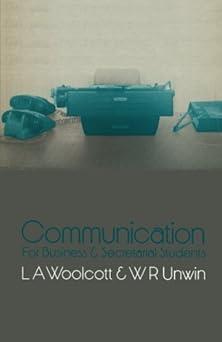Read the following passage and answer the questions below. Organised crime, as well as casual thefts and
Question:
Read the following passage and answer the questions below.
Organised crime, as well as casual thefts and pilferage, is a serious threat to the future growth of the fast-growing air-freight industry. Today perhaps as much as £400m. is being spent worldwide on moving cargo by air.
Although the bulk of this trade is carried in the cargo holds of passenger aircraft, the numbers of all-freight aircraft are increasing rapidly everywhere.
The main factors of fast transit, lighter handling, and less movement in the actual cargo stow generally result in good out-turns for air freight; but lax and often total lack of security on the part of airlines often offset these advantages.
This is not a new problem, of course, and insurers have for some years been trying to jolt those responsible into effective remedial action. Recently, Mr Gordon, of Lloyd's, proposed that airlines should bear, say, the first 10,000 dollars of all air cargo losses.
The aviation industry is fast approaching the kind of values which underwriters associate with shipping. As Mr Gordon pointed out, the value of any one aircraft these days with a cargo of gold and mail can amount to lOOm.
dollars.
Leading London underwriters would like the airlines to take part of the risk themselves. This underlying liability would be a strong incentive towards better security, they maintain. Mr Gordon went further and suggested that airlines should be graded and premium rate schedules fixed according to their handling records.
Earlier this year the United States Government published the report of a select committee appointed by the Senate to investigate theft and pilferage losses in air freight. The committee found present preventive measures ineffective. The most notable weakness was the absence of provision for systematic collection of data to help the formulation of preventive measures.
Another weakness was that crimes committed at airports were subject to many overlapping jurisdictions of law enforcement agencies. A third weakness was the passive role ot the air carriers themselves, in spite of their ultimate responsibility for the safety of the goods they transported. There was evidence of some division of authority among shippers, carriers, terminals and truckers.
Among the more obvious deficiencies found by the committee were inadequate fencing of cargo areas, unlimited access to cargo terminals and warehouses, and general staff parking directly adjacent to cargo areas and warehouses. None of the airports visited during the investigation had employee identification systems to prevent entry into cargo handling areas by unauthorised people, and a large number did not have special strongroom facilities for high-value cargo.
Insurers could add to this list. For example, packages are left in storage at airports and terminals and forgotten for long periods owing to faults in documentation; consignors often do not send value consignments as such, in order to save costs; and there is a lack of strong-boxes in all but the largest aircraft.
Meanwhile, there is little contact between the police authorities of the major international airports, although it is at least encouraging that the International Air Transport Association has recently formed an air cargo security sub-committee. As insurance losses of precious cargoes in recent years have been out of all proportion to premiums received, insurance markets are naturally perturbed at the continuing indifference displayed by airlines and governments.
Unless radical improvements in security are forthcoming, it seems that insurers will drastically revise their freight liability and other policies, and they may refuse to provide cover at all if specified safeguards are not arranged. Such a situation could retard the growth rate of air freight.
From The Times, 3 December 1970
(a) Give briefly the meaning of each of the following words as used in the passage:
incentive access indifference radical retard
(b) Why are the numbers of all-freight aircraft increasing?
(c) Why did Mr Gordon suggest that airlines should bear the first 10,000 dollars of all air cargo losses?
(d) Explain in your own words each of the three main weaknesses found by the Senate Committee.
(e) How could security be improved?
R.S.A. Stage II (Intermediate) The Office
Step by Step Answer:

Communication For Business And Secretarial Students
ISBN: 9780333261750
1st Edition
Authors: Lysbeth A Woolcott, Wendy R Unwin






